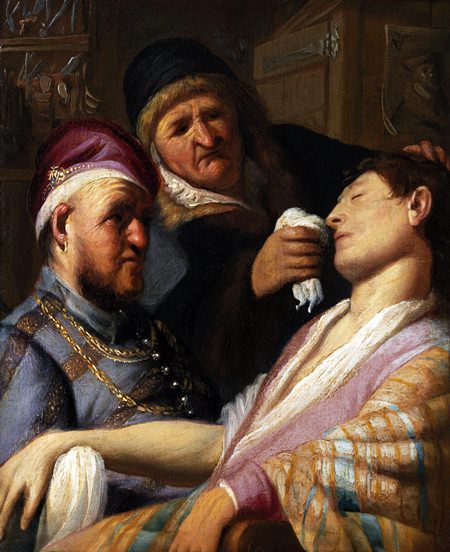Maastricht, Netherlands (AP) – The painting was labeled as the work of an unknown artist from Europe’s “Continental School,” dated somewhere in the 19th century. It had a presale estimate of $500-$800 when it went to auction in New Jersey last year.
French art dealer Bertrand Gautier thought the small oil-on-panel painting of three figures was older. And he thought he knew exactly who had painted it: Dutch master Rembrandt van Rijn.
Unfortunately for Gautier and his partner Bertrand Talabardon, another dealer had the same hunch. In a few minutes of phone bidding, the price shot up, and in the end the Paris gallery owners paid just over $1 million, including the buyer’s premium.
 The newly discovered painting by Dutch master Rembrandt titled The Unconscious Patient (Sense of Smell) is shown in this image released on Thursday March 10, 2016. (Galerie Talabardon & Gautier via AP)
The newly discovered painting by Dutch master Rembrandt titled The Unconscious Patient (Sense of Smell) is shown in this image released on Thursday March 10, 2016. (Galerie Talabardon & Gautier via AP)
Last week, the painting, restored and now considered a genuine Rembrandt dating from 1624-1625, hung in pride of place at the entrance to the gallery’s stand at the prestigious TEFAF art fair in the southern Dutch city of Maastricht.
“This is a great discovery. It really is absolutely fascinating. This is the very beginning of Rembrandt, more or less the first picture he ever painted,” said Prof. Christopher Brown, an expert in Dutch art at Oxford University.
It was painted when Rembrandt was just 18 or 19, at the start of his career, when he had finished his education in Amsterdam and moved back to his home town of Leiden.
“The drawing is slightly crude, the colors are very vivid,” Brown said. “It’s the beginning, the absolute beginning.”
The picture is part of a series depicting the five senses. It has been titled “The Unconscious Patient (Sense of Smell)” and shows a woman holding a handkerchief, presumably containing smelling salts, under the nose of a young man who has fainted after a surgeon has performed a blood-letting.
Three of the “sense” paintings were already known, and with the rediscovery of the sense of smell, only “taste” is missing.
Part of the reason the painting was not earlier positively identified as a Rembrandt was an 18th-century attempt to make it look more like … a Rembrandt, Gautier told The Associated Press.
“They knew it was a Rembrandt, but they didn’t think it looked enough like a Rembrandt,” he said. In an effort to add a bit more drama to the lighting, they enlarged the painting and made it darker around its edges. “They ‘Rembrandtized’ what was already a Rembrandt.”
“Today we can see it is ridiculous, but every era understands an artist in its own way,” he added. “Today, we have the good fortune to be able to place it in its historical context.”
After buying the painting at auction in New Jersey and setting the art world abuzz at the prospect that a “new,” Rembrandt had emerged, Gautier and Talabardon had it restored and fitted a frame that, when closed, shows only the part of the panel painted by Rembrandt but, when opened, shows the later additions to the work.
The restoration turned up another surprise — the earliest known signature by Rembrandt, a monogram of the letters “RF” or “RHF,” believed to stand for Rembrandt Harmensz fecit, meaning, made by Rembrandt — Rembrandt’s full name is Rembrandt Harmenszoon van Rijn.
“It’s nice that the monogram’s there,” Brown said. “It confirms what your eyes tell you.”
The painting drew plenty of admiring glances at the fair’s opening, but any potential buyers will have been disappointed — the Rembrandt has already been sold to the privately owned Leiden Collection in New York, which already owns two of the other “sense” paintings. Gautier declined to say how much he sold the painting for.




